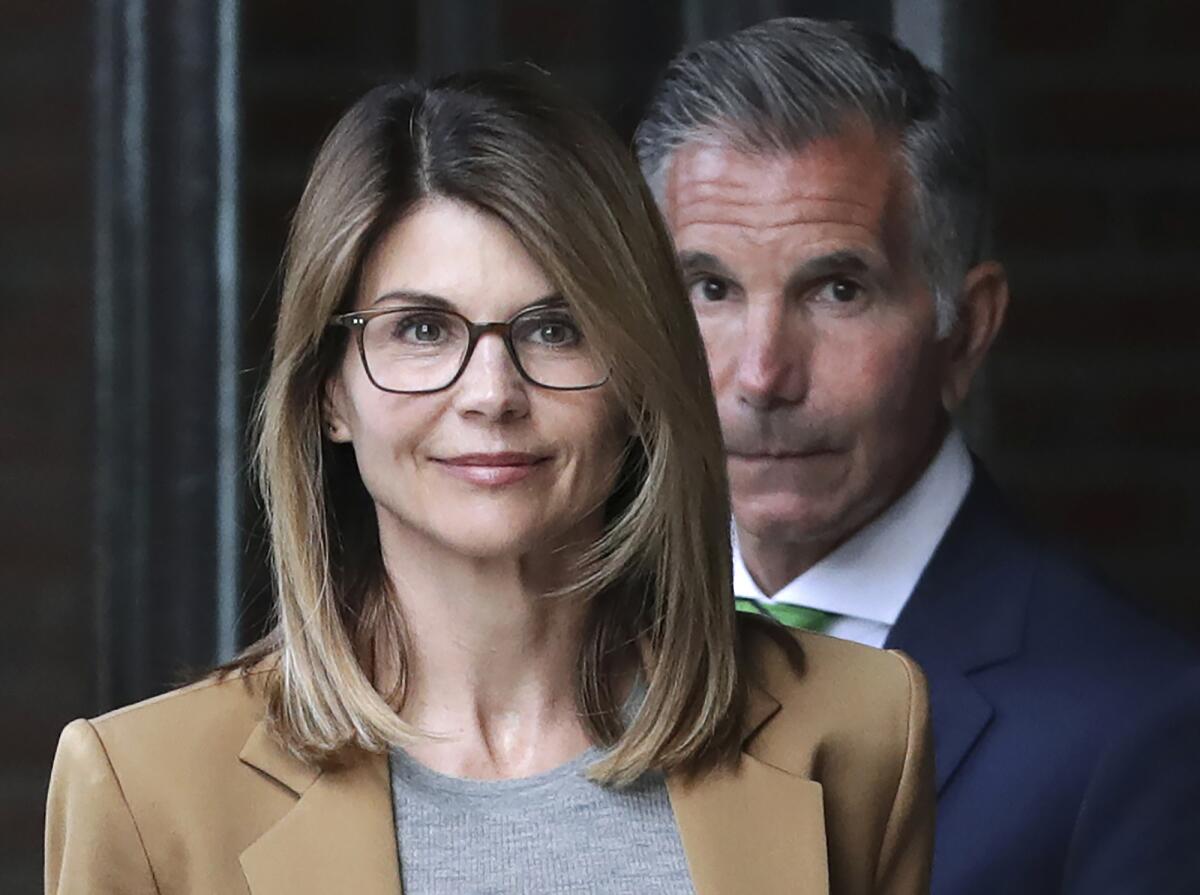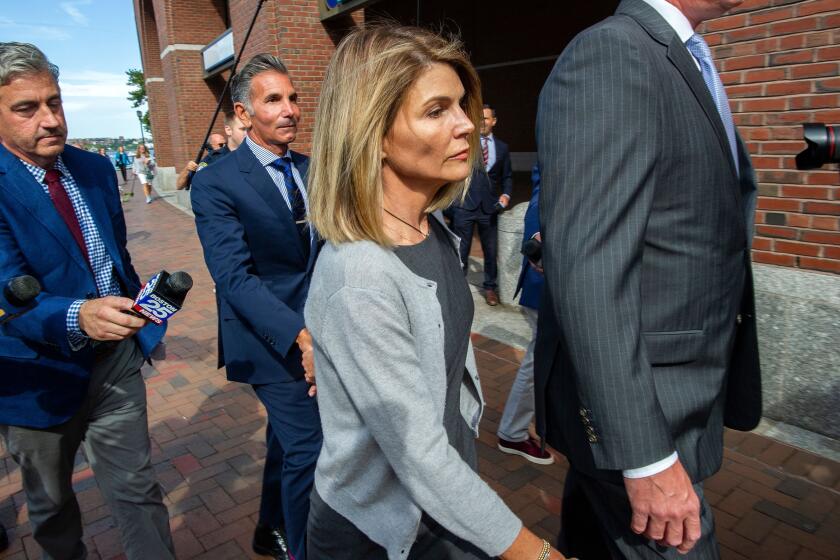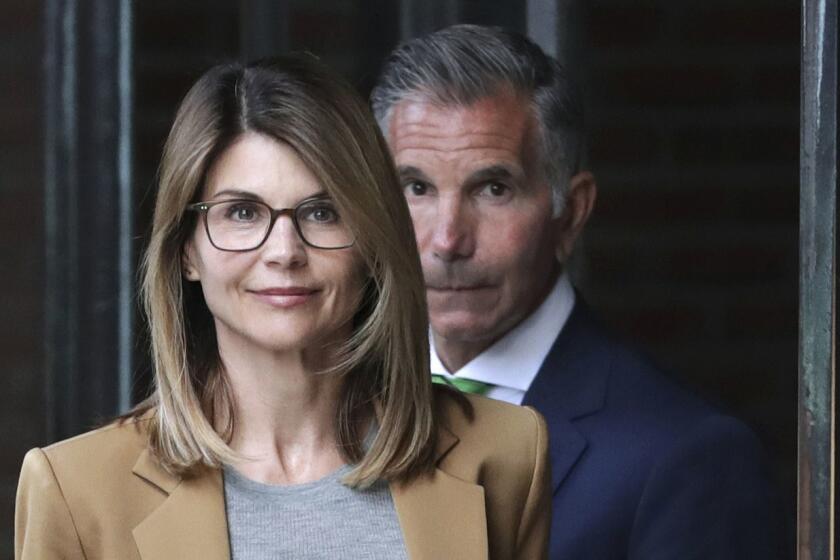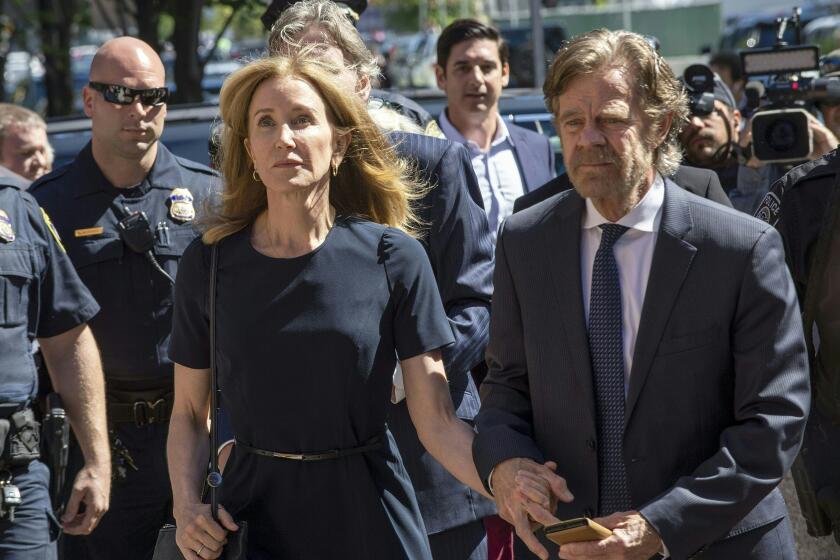Lori Loughlin always insisted she was innocent in admissions scandal. Why change now?

- Share via
From the beginning of the college admissions scandal, actress Lori Loughlin and her fashion designer husband, Mossimo Giannulli, have maintained they did nothing wrong.
While other key figures in the scandal, including “Desperate Housewives” actress Felicity Huffman, pleaded guilty and apologized, the couple’s attorneys assailed the prosecution’s case. They alleged the government had coerced its key witness and the scheme’s ringleader, William “Rick” Singer, into fabricating evidence; and they argued the government had contorted a legal, if unsavory, facet of the college applicant process — that donating money to a school will boost your child’s chances of admission — into a criminal conspiracy.
One of their attorneys, Sean Berkowitz, accused prosecutors of pursuing a “‘win at all costs’ effort rather than following their obligation to do justice.”
But this week, Loughlin and Giannulli reversed course. In documents unsealed Thursday, they agreed to plead guilty to fraud and spend several months in prison.
Lori Loughlin will plead guilty for her role in the college admissions scandal. She faces 2 months in prison.
While Singer’s scheme drew in billionaires and CEOs, Loughlin, famous for her role on “Full House,” became a lightning rod for public fascination and ire.
The couple’s guilty plea announcement marks a major moment in the scandal that rocked American academia.
Why did they change their plea?
It’s unclear, and Loughlin’s attorney declined to comment Thursday, but the reversal followed a significant legal setback.
Earlier this month, a judge declined to dismiss the fraud, bribery and money laundering charges against Loughlin and her co-defendants, ruling that federal agents and prosecutors did not pressure Singer, their chief cooperator, to mislead his clients on recorded phone calls and draw out flawed evidence of criminal intent.
Attorneys for Loughlin and 13 other parents charged in the college admissions scandal had asked U.S. District Judge Nathaniel M. Gorton to throw out the indictment against them, pointing to a note Singer wrote shortly after he began cooperating in September 2018. With investigators recording the line, Singer had called dozens of current and former clients and discussed the various schemes they are charged with exploiting to slip their children into such elite universities as Georgetown, USC, UCLA and Yale.
The couple insisted that Singer misled them into believing the money was destined for legitimate university purposes, not bribes to corrupt school employees.
As an October trial date approached, prosecutors released more details about their case. In one court filing, they made public a memo written by a private school college counselor who had clashed with Giannulli.
Last year, prosecutors added new bribery charges against the couple and other defendants who resisted taking a plea.
In November 2018, William “Rick” Singer picked up the phone in a government building in Boston and dialed a Los Angeles number. “Lori, it’s Rick Singer. How are you?”
What are they accused of doing?
Giannulli and Loughlin began conspiring with Singer in April 2016, an FBI agent wrote in an affidavit filed in court, when the fashion designer told Singer in an email, “I’d like to maybe sit with you after your session with the girls as I have some concerns and want to fully understand the game plan and make sure we have a roadmap for success as it relates to [our daughter] and getting her into a school other than ASU!”
Singer told the couple that their daughter’s academic qualifications were “at or just below the low end of USC’s admission,” according to the affidavit.
And so, prosecutors alleged, Loughlin and Giannulli agreed to tap what Singer called his “side door” into USC: bribing Donna Heinel, an athletics department official, to designate their two daughters as promising coxswains. Heinel, who was arrested in March 2019 and fired by USC, has pleaded not guilty to conspiracy to commit racketeering, bribery and fraud.
Loughlin and Giannulli’s payments were funneled through Singer’s charity, whose stated mission was to help “underprivileged students,” according to charging documents filed in federal court. The tax-exempt status for Singer’s Key Worldwide Foundation allowed some of Singer’s clients to write off bribes as charitable gifts on their taxes, authorities said.
California lawmakers have sent the governor a package of reforms sparked by the recent college admissions scandal, including a bill that requires special admissions of students at public universities to be approved by three campus administrators.
What punishment does the couple face?
Federal prosecutors and the couple’s attorneys agreed to ask a judge to sentence Loughlin and Giannulli to two and five months, respectively, in federal prison, the plea agreements say. Loughlin agreed to pay a fine of $150,000 and serve 100 hours of community service; her husband agreed to a $250,000 penalty and 250 hours of community service, the documents show.
District Judge Gorton must accept these terms. If he does, prosecutors will drop the money laundering and bribery charges a grand jury brought against the couple.
“These defendants will serve prison terms reflecting their respective roles in a conspiracy to corrupt the college admissions process and which are consistent with prior sentences in this case,” U.S. Atty. Andrew E. Lelling, whose deputies charged the case, said in a statement. “We will continue to pursue accountability for undermining the integrity of college admissions.”
Federal prosecutors accused top CEOs, two Hollywood actresses and others of taking part in an audacious scheme to get their children into elite universities through fraud, bribes and lies.
Where does this leave the larger case?
Of the 56 people charged in the case, 34 have pleaded guilty or agreed to do so.
A dozen parents are headed for trial, the first scheduled to begin Oct. 5 in Boston.
Some defendants have issued public apologies — in some cases, directed at their own children.
“I am ashamed of the pain I have caused my daughter, my family, my friends, my colleagues and the educational community,” Huffman wrote. “I want to apologize to them and, especially, I want to apologize to the students who work hard every day to get into college, and to their parents who make tremendous sacrifices to support their children and do so honestly.”
Time will tell whether Loughlin will offer public comments when she enters her plea in Boston court.
More to Read
Sign up for Essential California
The most important California stories and recommendations in your inbox every morning.
You may occasionally receive promotional content from the Los Angeles Times.












